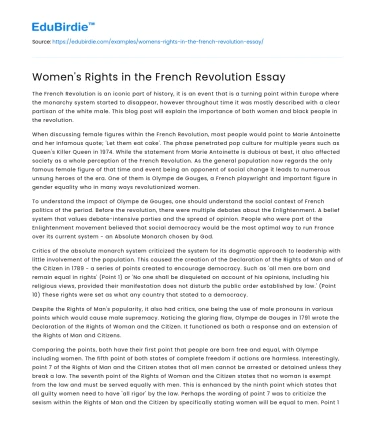The French Revolution is an iconic part of history, it is an event that is a turning point within Europe where the monarchy system started to disappear, however throughout time it was mostly described with a clear partisan of the white male. This blog post will explain the importance of both women and black people in the revolution.
When discussing female figures within the French Revolution, most people would point to Marie Antoinette and her infamous quote; 'Let them eat cake'. The phase penetrated pop culture for multiple years such as Queen's Killer Queen in 1974. While the statement from Marie Antoinette is dubious at best, it also affected society as a whole perception of the French Revolution. As the general population now regards the only famous female figure of that time and event being an opponent of social change it leads to numerous unsung heroes of the era. One of them is Olympe de Gouges, a French playwright and important figure in gender equality who in many ways revolutionized women.
Save your time!
We can take care of your essay
- Proper editing and formatting
- Free revision, title page, and bibliography
- Flexible prices and money-back guarantee
To understand the impact of Olympe de Gouges, one should understand the social context of French politics of the period. Before the revolution, there were multiple debates about the Enlightenment. A belief system that values debate-intensive parties and the spread of opinion. People who were part of the Enlightenment movement believed that social democracy would be the most optimal way to run France over its current system - an Absolute Monarch chosen by God.
Critics of the absolute monarch system criticized the system for its dogmatic approach to leadership with little involvement of the population. This caused the creation of the Declaration of the Rights of Man and of the Citizen in 1789 - a series of points created to encourage democracy. Such as 'all men are born and remain equal in rights' (Point 1) or 'No one shall be disquieted on account of his opinions, including his religious views, provided their manifestation does not disturb the public order established by law.' (Point 10) These rights were set as what any country that stated to a democracy.
Despite the Rights of Man's popularity, it also had critics, one being the use of male pronouns in various points which would cause male supremacy. Noticing the glaring flaw, Olympe de Gouges in 1791 wrote the Declaration of the Rights of Woman and the Citizen. It functioned as both a response and an extension of the Rights of Man and Citizens.
Comparing the points, both have their first point that people are born free and equal, with Olympe including women. The fifth point of both states of complete freedom if actions are harmless. Interestingly, point 7 of the Rights of Man and the Citizen states that all men cannot be arrested or detained unless they break a law. The seventh point of the Rights of Woman and the Citizen states that no woman is exempt from the law and must be served equally with men. This is enhanced by the ninth point which states that all guilty women need to have 'all rigor' by the law. Perhaps the wording of point 7 was to criticize the sexism within the Rights of Man and the Citizen by specifically stating women will be equal to men. Point 14 also states that women need to pay taxes. The statement that women were willing to pay taxes shows Olympe's desire for true equality where women and men have to deal with the same tasks, even what is seen to be a boring part of life - paying taxes.
The overall legacy of Olympe de Gouges is one of being forgotten by everyone outside of France. In France, her legacy is one of being a hero especially towards feminists with a song titled Olympe de Gouges by Femmouzes T. in 1996 praising that her admirers will revive her ideas.






 Stuck on your essay?
Stuck on your essay?

